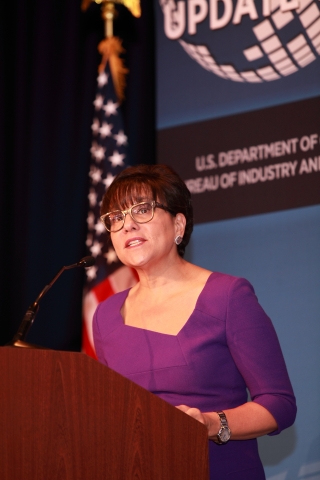Nov052015
Posted at 2:37 PM
This week, Secretary of Commerce Penny Pritzker addressed more than 1100 industry representatives during the Bureau of Industry and Security’s (BIS) annual conference to discuss export control policies and highlight how, BIS has an enormous impact on the nation’s safety and competitiveness.
As we celebrate American innovation during National Entrepreneurship Month, entrepreneurs launching new businesses or looking to export can look to BIS as a resource and learn how export control laws may be relevant to their operations.
Export controls help protect U.S. national security and foreign policy, and address proliferation concerns. By administering and enforcing export controls, BIS seeks to keep some of the most sensitive goods and technologies out of the most dangerous hands. BIS requires businesses to submit license applications for certain exports, and enforces the law against those who do not get required licenses. An export license grants permission to conduct a specified export transaction–to ship an item or to release software source code or technology. BIS then issues licenses after a careful review of the facts, and with input from other U.S. government agencies, including the State and Defense Departments.
The key issues involved in the review of a license, or whether a license is required include: What you are exporting, how the item will be used, as well as where and who the ultimate recipient will be. Although many items are not affected by export controls, high technology items and items destined for sanctioned countries, persons, or entities will often require a license from BIS; this includes commercial as well as some military items.
Here are the top five things entrepreneurs should know about export controls:
- BIS offers services for understanding export controls. BIS offers a variety of services to help you comply, including live seminars, an online training room, and regularly scheduled conference calls on export control regulatory changes and Cuba updates. We also offer consultations with export counselors who are also available by phone at (202) 482–4811, or (949) 660–0144 for our West Coast office.
- Export controls affect high tech industries, including items for commercial as well as military use. There is a misconception that export controls only affect military use items. Export controls also apply to sensitive or high technology commercial items. Examples include high-end machine tools and semiconductors, encryption software, night vision camera equipment, and technology for unmanned aerial systems. These and other items may require a license prior to shipment or transmission out of the United States.
- Exports to certain countries may be uniquely affected by export controls. Sanctions and other regulations can impose special restrictions that affect the export of many items—including “low tech” items in some cases—to particular destinations. BIS has a role in administering economic sanctions on countries such as Cuba, Russia, and Iran, among others. Exports destined for sanctioned countries will often require a license before they are exported, even if the items are not high tech.
- Export controls may affect companies and research institutions who employ foreign nationals or who collaborate with foreign nationals on research, even within the United States. A “deemed export” is the release of technology or source code to a foreign national in the United States. This is because our export control regulations treat such a release of controlled technology as an export to the individual’s home country. Therefore, a license may be required before you release controlled technology to a foreign national who does not hold a U.S. green card.
- There are exceptions. Even if your export would otherwise require a license under our regulations, it may qualify for a “license exception.” A license exception is an authorization that may allow you to export or reexport, under stated conditions, some items that would otherwise require a license. Four of our most common exceptions include allowing for replacement parts (License Exception RPL), shipments to certain government end-users (GOV), temporary exports (such as for exhibition, for tools of trade, or for repairs abroad) (TMP), and limited value shipments (LVS). In addition, in 2011, BIS added a new license exception called Strategic Trade Authorization (STA). STA facilitates trade with a list of 36 allied countries, and includes deemed exports to nationals of such countries.
For more information, please visit the BIS website at www.bis.doc.gov or follow us on Twitter @BISgov.

